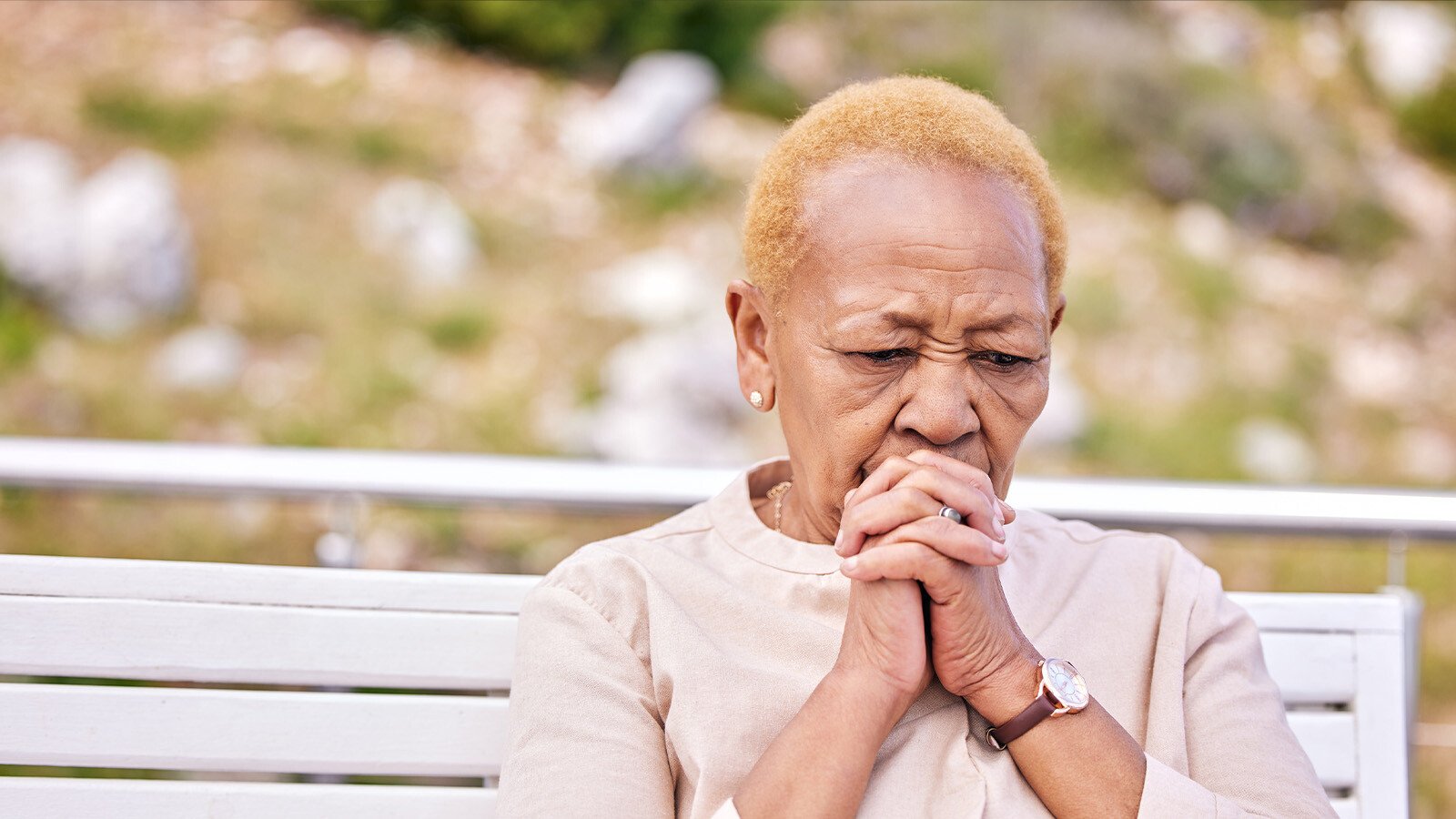Why Am I Angry?

Grief is like unexpected and unwanted house guests who arrive unannounced and overstay their welcome. We might also say that grief brings a companion—anger. And anger doesn’t sit quietly on the couch. When it isn’t seething, it’s slamming doors, breaking dishes, and demanding answers. Why does anger so often show up alongside grief?
You might have expected to feel sad, lonely, or even fearful when your loved one died. But you may not have expected to feel angry. Sometimes the surprising thing is the target that anger chooses. Anger may be directed toward God, others, yourself, medical professionals, or even the person who passed. When her husband died, Marion was expressing anger toward multiple targets. She says,
I was angry with my husband because I felt like he didn’t want to live and I was angry he didn’t do what I asked him to do, like take dialysis. In the back of my mind, I was thinking, If you had done what I asked you to do, you would not have died. I was angry with the nurse, because if I had known he was going to die I would have stayed instead of running an errand. I was angry with myself because I didn’t pick up that he was transitioning.
Ryan had competing emotions of anger and sadness after his brother-in-law died. He explains, “I was angry at Kevin. I was angry at the person who killed him, and I was really sad that Kevin died. And the confusion came in the fact that my anger and sadness were directed at the same person. They were both directed at Kevin, because Kevin had killed himself.”
Tom was angry with doctors for not finding blockages that could have saved his dad’s life. But he was really angry with God. He shares,
I felt like He abandoned me. I was angry at God because I read all the passages in the New Testament where many people were healed. When my dad was in the clinic, I prayed for days and nothing happened. His death felt like a rejection, like my family was rejected. I felt like God knew what was going on and He decided that it wasn’t worth His time to actually do something about it.
If you are experiencing anger while grieving, you aren’t alone. It is a common emotion associated with grief. Why do we often experience anger when grieving?
Why does grief spark anger?
 Anger is a powerful and complicated emotion. Positively, it can energize us to make needed change, but when out of control, it can negatively impact everything around us. Anger is triggered in situations that you feel are unjust or unfair and that challenge the way you think the world should operate. Grief provides many of these triggers.
Anger is a powerful and complicated emotion. Positively, it can energize us to make needed change, but when out of control, it can negatively impact everything around us. Anger is triggered in situations that you feel are unjust or unfair and that challenge the way you think the world should operate. Grief provides many of these triggers.
We all have expectations about how life will go—who will be with us, how long they’ll stay, and what our future will look like. A mild irritation or frustration can be incited by the difference between how life “might have been” (a wish) and how it turned out. But a stronger rage or resentment can be incited by the difference between how life “should have been” (a stronger expectation or demand) and how it turned out. That stronger indignation is what Bekah experienced after her husband died:
I was angry that all these great plans we had were falling apart. I was angry that the vision I had for what our family was supposed to be and how it was supposed to function wouldn’t work anymore. I was angry that I was losing the course I had plotted out for my kids. I felt like the world and the life I wanted had been kind of stolen from me.
Loss also leaves us with many unanswered questions. We like closure, tidy endings, and explanations that make sense, but grief rarely gives us that. Instead, we’re left with ambiguity, what ifs, and unresolved questions. When we can’t find answers, anger often becomes our response. Grief tends to expose our lack of control; this was Nora’s experience after her husband died:
I was just angry at the whole manifestation of his loss. I had no control over it. I was prepared to lose him in July, but I didn’t. Then when I was unprepared, I lost him. And all of that made me angry—angry that life is the way it is, angry that I had no control over his illness. I had no control over his death. I had no control over the fact that he was gone, and I was left to live without him.
Because anger can range in intensity from mild to strong, it can steer our facial expressions, tone of voice, choice of words, and behavior in both subtle and obvious ways. It seeps into our actions as well as our words. What does grief-related anger actually look like? How does it show up in daily life?
What does anger in grief look like?
If you’ve seen the Pixar film Inside Out, you probably remember Anger—the little red guy with flames shooting from his head. When something goes wrong he erupts, slamming buttons and yelling at the top of his lungs. That’s how we often picture anger—loud, explosive, impossible to miss.
 But in grief, anger doesn’t always look like that. It can hide beneath exhaustion, frustration, or even silence. Here are some ways anger in grief might show up:
But in grief, anger doesn’t always look like that. It can hide beneath exhaustion, frustration, or even silence. Here are some ways anger in grief might show up:
- Outward expressions: Irritability, snapping at loved ones, withdrawing from relationships.
- Inward struggles: Self-blame, guilt, bitterness, feelings of abandonment.
- Physical signs: Restlessness, headaches, increased heart rate, tightness in your chest.
- Spiritual struggles: Questioning God, difficulty praying, feeling distant from the Lord, the Scriptures, and the church.
We might group the expressions of unhealthy anger into two categories: rage and resentment.
Rage is the kind of anger that bursts out; it is the overt display of anger. This could be slamming doors, shouting at loved ones, or even physical aggression. But sometimes it is seen in frustration that boils over, in being short-tempered, or in reacting more strongly than a situation warrants. Think of words like fury, outrage, annoyance, or feeling “miffed.”
Resentment (bitterness) is different; it is anger turned inward. This kind of seething anger quietly eats away at our hearts over time. Instead of erupting, it lingers in the form of passive aggression, detaching from others, feeling indifferent toward people who care, or carrying a silent grudge. Think of words like indifference, bitterness, irritation, or exasperation.
This is what it looks like if we are not managing our anger well. But there are healthy ways to manage anger and even use it positively.
What are healthy ways to manage anger?
While anger can be used destructively, it can also be used constructively. Al, whose father died by suicide, realized that “there is a righteous anger, when we are rightfully angry that something is wrong in the world. We can legitimately say, ‘This is not the way things are supposed to be.’ And we can be angry about that.”
You might be wondering, “What do I do with this anger? How do I channel it in an appropriate way?” Pastor Thabiti Anyabwile offers this counsel:
We should feel it. We shouldn’t necessarily try to tamp it down and ignore it. We should express it in a healthy way. We can do that through prayer. Or that can be done in the pursuit of justice. Or you could get involved in a cause of some sort that allows you to express that righteous indignation in a constructive, positive way. And ultimately that’s what we want to do with our anger—we want to channel it into something constructive and positive.
But it is easy for even righteous anger to grow out of proportion and morph into rage or resentment. Here are a few strategies for helping you cope with anger and keep it under control:
- Acknowledge the anger you notice. Anger is an uncomfortable emotion for many people, which means we like to pretend it isn’t there. But that won’t make it go away. Be honest about what you are feeling and where it is coming from.
- Take it to God. The psalms are full of people experiencing anger. God is not afraid of your emotions; you can bring your anger to Him.
- Find a healthy outlet. Journaling, exercise, or talking with a trusted friend can provide a healthy outlet for processing your anger.
- Practice forgiveness. This might involve forgiving the person who died, forgiving other survivors, or even working through the anger you feel toward God.
Anger in grief is real, but it doesn’t have to derail your journey. God doesn’t leave us to navigate this pain on our own. Ultimately, the gospel gives us the greatest hope in grief. Jesus Himself experienced sorrow, loss, and even righteous anger. There is a story in John 11 where we see Jesus’ emotional response to the death of His friend Lazarus. He experienced a righteous indignation appropriate to the situation, seeing the anguish all around Him. But in His ministry as “the resurrection and the life,” He also provided the ultimate answer (John 11:25). Jesus raising Lazarus from the grave was a foretaste of His promise of a future where loss and anger will be no more.
 If you’re struggling, know that you’re not alone. If you are looking for a community, one grief support group that builds on Jesus’ model, guidance, and strength is GriefShare. GriefShare has guided thousands of grievers on their grief journeys, including those who’ve needed to learn how to forgive. To find a GriefShare group, either online or in person, go to griefshare.org.
If you’re struggling, know that you’re not alone. If you are looking for a community, one grief support group that builds on Jesus’ model, guidance, and strength is GriefShare. GriefShare has guided thousands of grievers on their grief journeys, including those who’ve needed to learn how to forgive. To find a GriefShare group, either online or in person, go to griefshare.org.


